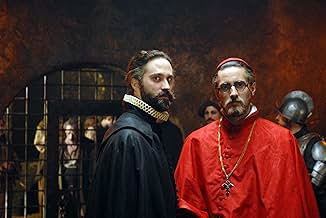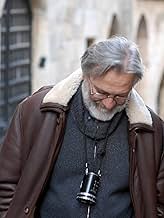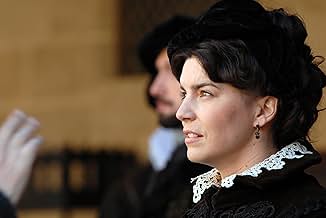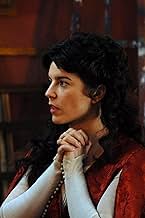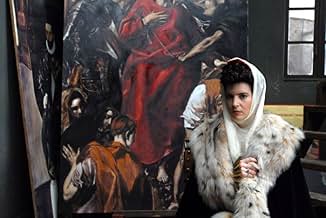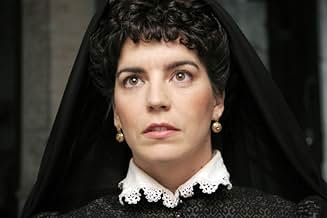El Greco
- 2007
- 1h 59min
Ajouter une intrigue dans votre langueThe story of the uncompromising artist and fighter for freedom, Domenicos Theotokopoulos, known to the world as "El Greco".The story of the uncompromising artist and fighter for freedom, Domenicos Theotokopoulos, known to the world as "El Greco".The story of the uncompromising artist and fighter for freedom, Domenicos Theotokopoulos, known to the world as "El Greco".
- Réalisation
- Scénario
- Casting principal
- Récompenses
- 12 victoires et 2 nominations au total
- El Greco
- (as Nick Ashdon)
- Duke Da Rimi
- (as Yorgos Christodoulou)
- Don Miguel de las Cuevas
- (as Fermi Reixac)
- Manousos
- (as Theo Zoumpoulidis)
- Titian's Assistant
- (as Yorgos Karamichos)
- Auctioneer
- (as Renos Charalampidis)
- Greco's Father
- (as Yorgos Charalampidis)
- Older Inquisitor
- (as Ricard Borras)
Avis à la une
This is a costumer partially based on facts but predominates the slow-moving melodrama . Historic film about an uncompromising artist , El Greco/Nick Clark and his relationship to lovers and powerful people from Renaissance . The picture relies heavily on the loving relationships between El Greco and his women as Francesa/Dimitra Matsouka and Jerónima De Las Cuevas/Laia Marull as well as the patronage and subsequent confrontation to Niño De Guevara , the General Inquisitor/Juan Diego Botto , that was painted on a famous painting. This is a moving biography of the prestigious painter and fighter for freedom , including some fictitious elements . Glamorously as well as sumptuously photographed by Stavrou , and being lavishly produced by Greece and Spain . The motion picture was professionally directed Yannis Smaragdis and filmed with a pervasive melancholy that does for slow drama .
The picture based on actual events , these are the followings : In 1577, El Greco migrated to Madrid, then to Toledo, where he produced his mature Works . At the time, Toledo was the religious capital of Spain and a populous city . In Rome, El Greco had earned the respect of some intellectuals, but was also facing the hostility of certain art critics . During the 1570s the huge monastery-palace of El Escorial was still under construction and Philip II of Spain was experiencing difficulties in finding good artists for the many large paintings required to decorate it. El Greco met Benito Arias Montano, a Spanish humanist and agent of Philip; Pedro Chacón, a clergyman; and Luis de Castilla, son of Diego de Castilla, the dean of the Cathedral of Toledo. El Greco's friendship with Castilla would secure his first large commissions in Toledo. He arrived in Toledo by July 1577, and signed contracts for a group of paintings that was to adorn the church of Santo Domingo el Antiguo in Toledo and for the renowned El Espolio. By September 1579 he had completed nine paintings for Santo Domingo, including The Trinity and The Assumption of the Virgin. These works would establish the painter's reputation in Toledo. El Greco did not plan to settle permanently in Toledo, since his final aim was to win the favor of Philip and make his mark in his court. Indeed, he did manage to secure two important commissions from the monarch: Allegory of the Holy League and Martyrdom of St. Maurice. However, the king did not like these works and placed the St Maurice altarpiece in the chapter-house rather than the intended chapel. He gave no further commissions to El Greco. The exact reasons for the king's dissatisfaction remain unclear. Some scholars have suggested that Philip did not like the inclusion of living persons in a religious scene; some others that El Greco's works violated a basic rule of the Counter-Reformation, namely that in the image the content was paramount rather than the style. Philip took a close interest in his artistic commissions, and had very decided tastes; a long sought-after sculpted Crucifixion by Benvenuto Cellini also failed to please when it arrived, and was likewise exiled to a less prominent place. In any case, Philip's dissatisfaction ended any hopes of royal patronage El Greco may have had . Lacking the favor of the king, El Greco was obliged to remain in Toledo, where he had been received in 1577 as a great painter. While "Crete gave him life and the painter's craft, Toledo a better homeland, where through Death he began to achieve eternal life" . On 12 March 1586 he obtained the commission for The Burial of the Count of Orgaz, now his best-known work. During these years he received several major commissions, and his workshop created pictorial and sculptural ensembles for a variety of religious institutions, as the commission of The Virgin of the Immaculate Conception and for the Hospital of Saint John the Baptist , creating notorious paintings as The Disrobing of Christ , The Assumption of the Virgin , THe Holy Trinity , The Virgin of the Immaculate Conception .. In his mature works El Greco demonstrated a characteristic tendency to dramatize rather than to describe and the strong spiritual emotion transfers from painting directly to the audience . El Greco's preference for exceptionally tall and slender figures and elongated compositions, which served both his expressive purposes and aesthetic principles, led him to disregard the laws of nature and elongate his compositions to ever greater extents, particularly when they were destined for altarpieces .
The tag line of this movie is "Can darkness overcome light?"
Widely promoted as "the most important Greek production ever" (of which there seems to be a new one every year), El Greco seems bound to achieve considerable commercial success in the Greek market. But it is the kind of movie most people will claim to like, and no one will bother to see twice. Which, after all, is the true indicator of a film's appeal. We weren't expecting loud explosions and car chases on a production about El Greco ; but a reasonable, intelligent plot and dialog that would not make you squirm in your seat in embarrassment would have been nice.
Not recommended. For those that missed it, worry not. You'll have another "greatest Greek production ever" foisted on you by the Greek television channel-sponsors to look forward to next year.
It lacks of almost everything. No good dialogues, good actors wasted due to a, being good, a very poor script. It's a voice in off who tells you most part of the story... why do you want actors then I asked.
Probably the customs, colours and music is the only thing you can remember after watching it but not enough. I wanted to stop the movie several times cause is so superficial. You don't get involved at all with any of the characters, not with the story. Actually you don't care about El Greco after 20 min watching it.
I could feel the same frustration when I saw "El Capitán Alatriste". The Spanish movie with the highest budget ever in this country. Very, very disappointing. El Greco is, with all my respects, The Greek-Crap.
Le saviez-vous
- AnecdotesThe last acting performance by Sotiris Moustakas.
- GaffesJust after the battle, the wound on El Greco father's forehead changes places between shots, from left forehead to just over his eyebrow.
- Citations
El Greco: You once reached out for God, and your fingers closed on emptiness ; and you didn't learn. How can God speak to you when instead of loving you burn, ruin and spread hatred all around?
El Greco: Now, of course, my turn has come - but you can't burn me... and I'll tell you why :
El Greco: Because I've been burning all my life, my entire life ; not in the fire, in the light. I threw myself into the blaze of it.
El Greco: You light fires because you're afraid to burn. You are afraid of the light and this is why I pity you, my old friend, Niño de Guevara.
El Greco: Because you aren't wrong to be afraid, but every flame you light drives you deeper into the darkness and no matter how many people you burn, you will never escape it.
El Greco: Can the darkness condemn the light?
- Bandes originalesTa dakrya einai dyo logio
Performed by Loudovikos ton Anogeion
Meilleurs choix
- How long is El Greco?Alimenté par Alexa
Détails
- Date de sortie
- Pays d’origine
- Langues
- Aussi connu sous le nom de
- El Greco - El último desafío a Dios
- Lieux de tournage
- Rhodes, Grèce(Castle of the Grand Master)
- Sociétés de production
- Voir plus de crédits d'entreprise sur IMDbPro
Box-office
- Montant brut mondial
- 9 620 040 $US
- Durée1 heure 59 minutes
- Couleur
- Mixage
- Rapport de forme
- 1.78 : 1
Contribuer à cette page


